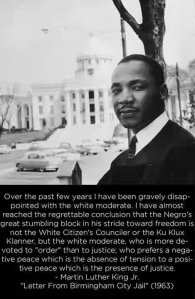
A lot of people, not just the moderates that Dr. King talked about in that quote from Letter From Birmingham City Jail, rationalize and deny the existence of bigotry by making appeals to certain fallacies. Academically, we often state those myths as five fallacies:
- Individualistic Fallacy: racism/homophobia/antisemiticism/etc is perceived as being only interpersonal, ignoring the systemic structural realities (such as underfunded schools)
- Legalistic Fallacy: the belief that abolishing racist/homophobic/religious laws automatically ends the bigotry.
- Tokenistic Fallacy: the inference that the presence of members of the marginalized class in influential positions in society proves that all bigotry has ended.
- Ahistoric Fallacy: the belief that the denial of basic rights in the past has no lasting effect on subsequent generations (“but slavery is over!”).
- Fixed Fallacy: assumes there is one and only one kind of discrimination, not recognizing new forms that emerge in context of societal and legal changes.
There’s an academic paper that explains all of this: WHAT IS RACIAL DOMINATION?, by Matthew Desmond & Mustafa Emirbayer of the University of Wisconsin—Madison, if you want to get into it. It’s rather long and involved, but if you open the PDF at the link and search for Five Fallacies you can jump right to their discussion of the fallacies. The paper is focused on racism, but the fallacies apply to all kinds of bigotry.
All of those fallacies contribute to that preference for an absence of tension rather than a passion for justice that Dr. King talked about. It’s the classic “Can’t You Get Past it/Live and Let Live Fallacy.” Or maybe another name could be the “Respectful Disagreement Fallacy.” It’s the belief that as long as a person isn’t physically attacking you right this moment, and is framing their critiques in polite-sounding language, than it can’t possibly be racist/homophobic/antisemitic/misogynist/etc.
So the bigot talks in dog whistles (coded language that doesn’t sound overtly like bigotry to people who don’t know the code), claims to respect or even feel love for the community targeted by their language, and if we point out that they are being racist or misogynist or antisemetic or homophobic, we’re the ones causing a problem. And people who think of themselves as moderate or enlightened turn on us. They don’t just look the other way from the bigotry and bigoted policies that the community is enduring, they actually enable it.
Which means they’re part of the problem. They’re not being neutral. They’re not seeing things from both sides. They’re not being nuanced. They’re oppressing other people.
I wish there was a simple solution. I wish I had some words of wisdom. Instead, I’m just stuck with this regrettable conclusion, having to try to educate people who don’t think they’re being an enemy.
“Over the past few years I have been gravely disappointed in the white moderate. I have almost reached the regrettable conclusion that the Negro’s great stumbling block in his stride toward freedom is not the White Citizen’s Counciler or the Ku Klux Klanner, but the white moderate, who is more devoted to ‘order’ than to justice: who prefers a negative peace which is the absence of tension to a positive peace which is the presence of justice.”
— Martin Luther King Jr, Letter From Birmingham City Jail (1963)
1 thought on “Myths about bigotry: respectful disagreement”